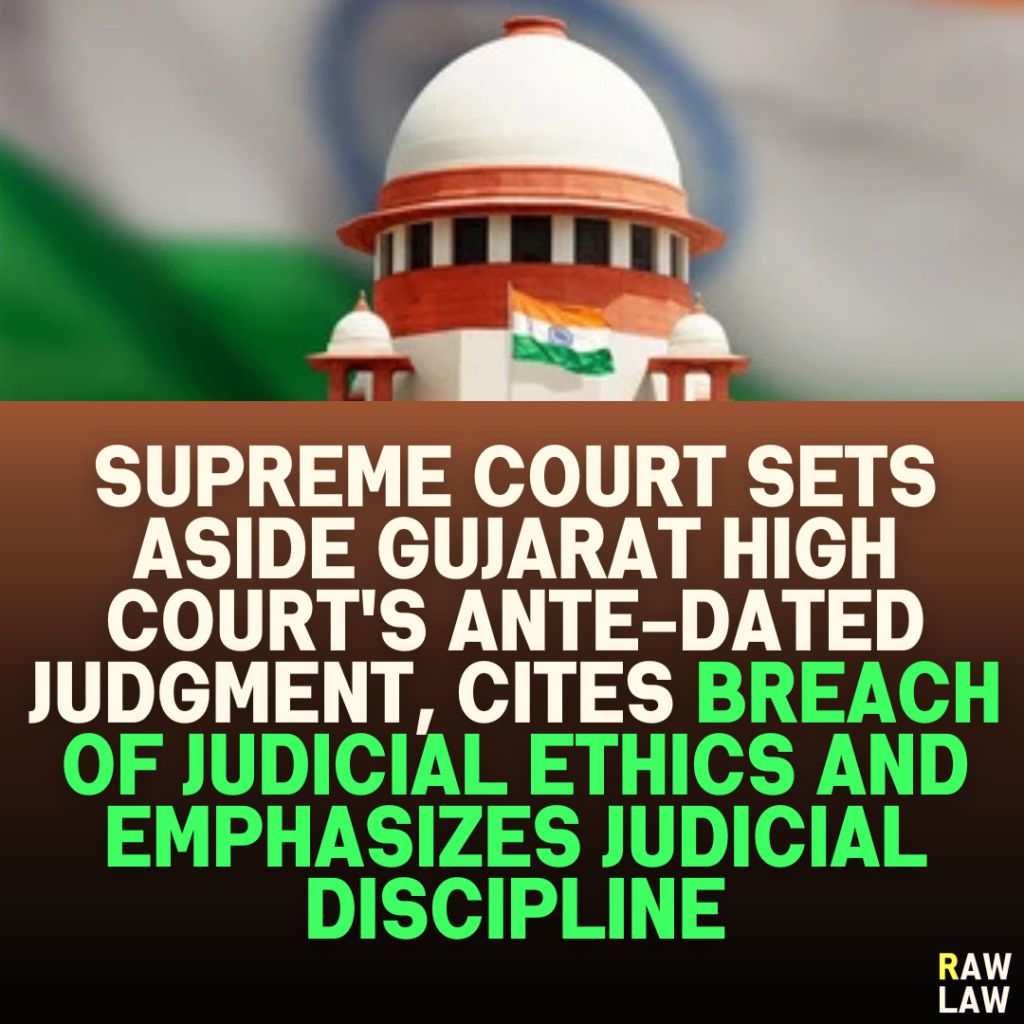Court’s Decision:
The Supreme Court of India set aside a judgment of the Gujarat High Court dated 1st March 2023. The apex court found that the High Court had violated judicial principles by ante-dating a reasoned order. The case has been remanded to the High Court for fresh consideration by a different judge. The Court emphasized that judgments must be delivered in a timely and transparent manner, stressing that the practice of delayed reasoning erodes public confidence in the judiciary.
Facts:
The appellant had filed a petition under Article 227 of the Constitution before the Gujarat High Court challenging an order passed by the Deputy Collector, Surat. The petition was heard on 1st March 2023, but the detailed reasoned order was not pronounced on the same date. Instead, more than a year later, on 30th April 2024, the appellant received a reasoned judgment dated 1st March 2023, leading to an allegation that the order had been ante-dated.
Issues:
- Whether the Gujarat High Court improperly delayed the issuance of a reasoned order.
- Whether the ante-dating of the judgment violated judicial discipline and fairness.
Petitioner’s Arguments:
The appellant argued that the reasoned judgment was passed more than a year after the hearing and was ante-dated to project that it had been delivered on 1st March 2023. The appellant also contended that this act deprived them of their right to timely justice and redressal.
Respondent’s Arguments:
The respondents did not dispute the timeline but contended that the petitioner had knowledge of the dismissal of their petition as soon as the High Court judge verbally pronounced the outcome on 1st March 2023.
Analysis of the Law:
The Supreme Court analyzed the principles governing the timely pronouncement of judgments, drawing from precedents like Balaji Baliram Mupade v. State of Maharashtra and Anil Rai v. State of Bihar. The Court reiterated that delayed judgments, especially those where the reasons follow long after the decision, violate Article 21 of the Constitution, which guarantees the right to life and personal liberty, including the right to timely justice.
Precedent Analysis:
In Balaji Baliram Mupade, the Supreme Court had emphasized the need for prompt delivery of judgments, highlighting that delays deprive aggrieved parties of the opportunity to seek further legal remedies. Similarly, in Anil Rai v. State of Bihar, the Court had laid down specific timeframes for pronouncing reserved judgments.
Court’s Reasoning:
The Court held that while the appellant’s counsel had knowledge of the dismissal on 1st March 2023, the delay in providing the reasoned judgment for over a year was inexcusable. The Court noted that the judge’s failure to state “reasons would follow” rendered the court functus officio after the verbal pronouncement. The issuance of the reasoned judgment more than a year later was seen as a breach of judicial ethics and norms.
Conclusion:
The Supreme Court concluded that the Gujarat High Court’s ante-dated judgment must be set aside. The petition is to be revived and reconsidered by a different judge of the High Court, uninfluenced by the previous order.
Implications:
This decision underscores the importance of timely and transparent judicial pronouncements. The Supreme Court’s observation that justice must not only be done but also be seen to be done serves as a stern reminder to the judiciary to maintain public trust by adhering to established judicial discipline.




Pingback: Jharkhand High Court Modifies Conviction from Section 302 to Section 304 Part-II IPC: Absence of Severe Injuries and Lack of Direct Link to Cause of Death Leads to Appellant's Release After Serving Nine Years for Homicide in Domestic Dispute - Raw La